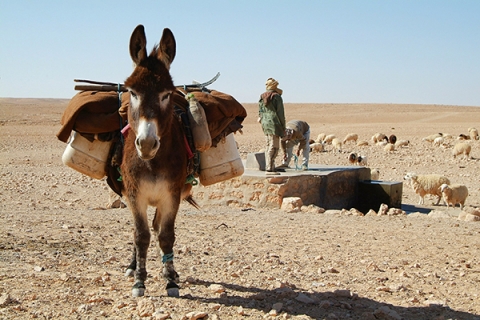

Donkeys are most at home on bright, warm days and tend to run for cover in Britain’s cold, wet weather, according to new research.
The first study to examine donkey’s ability to endure cooler, wetter climates showed that while horses can cope with cold, wet weather, most donkeys seek shelter when it starts to rain and when temperatures drop below 14 degrees.
Across all weather conditions observed, most horses can be found outside.
The research by equine behaviour expert Dr Leanne Proops, in the University of Portsmouth’s Department of Psychology, is published in the Journal of Veterinary Behavior.
Dr Proops said: “We found that donkeys were much more likely than horses to seek shelter when it’s windy, rainy or cold.
“This makes a lot of sense when you consider the evolutionary history of each species – horses are thought to have been domesticated in the temperate regions of Eurasia, while domestic donkeys originated from the African wild ass in semi-arid regions of Northeast Africa. This means that horses tend to be better adapted to the temperate climate of the UK, whereas donkeys are better suited to hotter, drier climates.
“We hope these findings can be used by those who care for either species to better protect them from conditions they’re not suited to."
We found that donkeys were much more likely than horses to seek shelter when it’s windy, rainy or cold. We hope these findings can be used by those who care for either species to better protect them from conditions they’re not suited to.
The research team studied 208 healthy, semi-free ranging donkeys and horses in Somerset and Devon over 16 months.
The temperature, wind speed, rainfall, light and density of and degree of harassment by flying insects at each site were measured to assess which factors prompted the animals to seek shelter.
All the donkeys and 30 of the 73 horses and ponies were owned by The Donkey Sanctuary, which funded the research. None of the animals were clipped or wore rugs and they had a mixture of coat colours, from light to dark.
In the data collected, the temperature varied from 1-33 degrees Celsius.
Overall, unless it was hot and dry, donkeys spent a great deal less time outdoors than horses, preferring the sanctuary of a shelter. When it rained, donkeys were three times more likely than horses to stay indoors.
The two species reacted very differently to wind, too, with a fresh to moderate breeze sending 61 per cent of donkeys and only five per cent of horses inside.
In high light levels (lux), donkeys were most often outside, while in the same light conditions, horses preferred to seek shade of trees or a man-made shelter.
Some significant differences in behaviour were seen in different combinations of weather conditions, too, with rain and wind together being the most likely combination to drive both species inside.
When insect harassment rose, horses went inside, and donkeys went outside, though that could be due to insect harassment increasing at higher temperatures.
It is interesting to see such a disparity in shelter seeking behaviour between the two species. Of particular relevance to our work at The Donkey Sanctuary, this research validates our long-held belief that donkeys need shelter from inclement weather.
Dr Faith Burden, director, research and operational support at The Donkey Sanctuary said: “It is interesting to see such a disparity in shelter seeking behaviour between the two species. Of particular relevance to our work at The Donkey Sanctuary, this research validates our long-held belief that donkeys need shelter from inclement weather.
“What we didn’t necessarily anticipate finding was the horses’ preference to be sheltered from insects in the sunny summer months. With summer and ‘fly season’ just around the corner it is clear that each species requires shelter at different times and for different reasons.
“We would encourage all equine owners to consider providing appropriate shelter to their animals throughout the year so that they can choose when they use it giving them the ability to manage their own needs.”
The study’s partners included Canterbury Christ Church University, the Dartmoor Pony Heritage Trust and Natural Horse Management expert Lucinda McAlpine.
